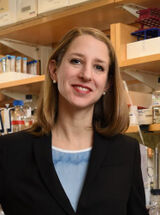- Home
- people
- faculty trainer directory
- Kara Bernstein, PhD
Kara Bernstein, PhD

Degrees:
B.A. (Biology) Bryn Mawr College, 2000. M.Phil. (Genetics) Yale University, 2004. Ph.D. (Genetics) Yale University, 2006.
Research Interests:
232aBreast and ovarian cancer can be caused by a combination of our environmental exposures as well as our genetic make-up. Family history of breast and ovarian cancer can be used to predict whether or not an individual needs additional screening or testing. Our research focuses on proteins that contribute to breast and ovarian cancer development and studies how accurate repair of DNA double-strand breaks is regulated using the budding yeast and mammalian systems. We have been focusing on the DNA repair genes, the RAD51 paralogs, which when mutated lead to increased breast and ovarian cancer risk using genetic, biochemical, and cell biological approaches. By understanding RAD51 paralog molecular function, the our lab aims to determine individuals who are at risk for cancer development and how cancer risk is compounded upon exposure to environmental toxicants that damage DNA.
Rotation Projects: My lab studies mechanisms of cancer development and how misregulation of DNA repair genes contributes to genetic instability and tumorigenesis. Part of my lab uses mammalian cells to study the RAD51 paralogs, genes that are mutated in hereditary breast and ovarian cancer, to determine their molecular function and to analyze patient derived mutations for DNA repair defects using genetics, molecular biology, and cell biology techniques. The other part of my laboratory uses the budding yeast system to dissect RAD51 paralog molecular function using genetic, biochemical, and molecular biology techniques.
Project 1: To analyze RAD51 paralog cancer-identified mutations for altered protein interactions and DNA repair defects using yeast-2-hybrid system and mammalian cell recombination reporter assays. This project will enable reclassification of variants of unknown function significance as pathogenic or benign.
Project 2: To determine how cancer variants in the RAD51 paralogs impact replication fork dynamics using single molecule DNA fiber analysis.
Project 3: To uncover new therapeutic strategies to treat homologous recombination deficient tumors using combination therapies.
Project 4: To analyze RAD51 paralog function during DNA replication using the budding yeast system to uncouple a new functional interaction between the RAD51 paralogs and the MCM complex. This project will analyze protein interactions and also use genetic and molecular biology techniques to uncover separation-of-function alleles.
Keywords: Breast and Ovarian Cancer DNA repair Homologous Recombination DNA replication RAD51 RAD51 paralogs
(215) 746-6264
Email
Bernstein Lab
Mentor Training Completed
Unconscious Bias Trained
Grad Group Affiliations: BMB (Biology and Molecular Biophysics), CAMB (Cell and Molecular Biology), G&E (Genetics and Epigenetics), PGG (Pharmacology Graduate Group)
Languages Spoken: English

